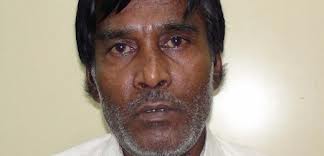Sukharanjan Bali, a key witness in the war crimes trial of Jamaat e Islami deputy leader Delwar Hossain Sayeedi who was abducted from the premises of the International Crimes Tribunal before having a chance to testify last November, has been languishing in a Kolkata jail since the end of 2012. This was revealed Thursday first by the daily New Age, followed by a statement from New York-based advocacy group Human Rights Watch independently verifying the claim and urging the Indian authorities to take all necessary steps to protect Bali.
Later on Thursday evening, BBC Bangla came up with its own report that confirmed Bali was being detained at the West Bengal capital’s Dum Dum Jail. I
n a statement given to New Age while under detention, Bali confirmed that on the morning of November 5th, 2012, he was ‘abducted from the court premises in a police van and was taken to an office in Dhaka’ which he later thought belonged to the Detective Branch of the police because of words on a paper stamp which he saw on the desk.
Extracts from the statement were published in Thursday’s edition of New Age. In it, Bali further says that the ‘people in the office were in police uniforms and the ones who abducted me were in civil clothes.’
He stated that he was not subject to any torture at the Dhaka office but ‘was being asked the reason why I was supportive of Sayedee sahib.… They said that I will be killed and Sayedee sahib will be hanged.’
According to his statement, Bali remained in illegal detention in Dhaka for six weeks before being handed over to India’s Border Security Force near the end of December 2012, and that he has been detained in different Indian jails ‘for the past four months and a half’, presumably up to the date the statement was given.
The statement was communicated by an Indian citizen who wished to remain anonymous for security reasons. The BBC Bangla report received confirmation from jail sources that Bali had indeed managed to get a statement delivered across the border to Bangladesh.
If Bali’s allegations against the state prove true, calls for a retrial in the face of such obstruction of the course of justice by the state are bound to get louder.
Meanwhile, HRW claimed to have learned in March that Bali was in Dum Dum jail in Kolkata, but prior to New Age breaking the story, did not make the information public pending meeting Bali to ensure that this would not jeopardise his safety.
The HRW statement on the matter expressly said India should not return Bali to Bangladesh until he is interviewed by the Indian office of the United Nations High Commissioner for Refugees (UNHCR), which can determine if he wishes to claim asylum and whether he is a refugee. If he does not wish to claim asylum, or his asylum claim is rejected, India should still not return him to Bangladesh when there is a real risk to his life or of his suffering ill-treatment if he returns there.
‘Those involved in his abduction may have assumed Bali would be killed by the Indian Border Security Force when he was pushed into India, or that he would permanently disappear,’ said Brad Adams, South Asia director at HRW. ‘There is a real risk to Bali if he is returned to Bangladesh, as he could expose those involved in his abduction.’
Bali was due to appear to give evidence as a defence witness before the ICT, a court expressly set up to try people suspected of war crimes during Bangladesh’s 1971 war of Independence. He had previously been listed as a prosecution witness.
According to the defence, Bali was expected to testify that Sayeedi had not killed his brother Bisha Bali as is alleged among charges that saw the charismatic Jamaat convicted and awarded the death penalty by the ICT on February 28.
The case currently sits in appeal with Bangladesh’s Supreme Court. UNB




